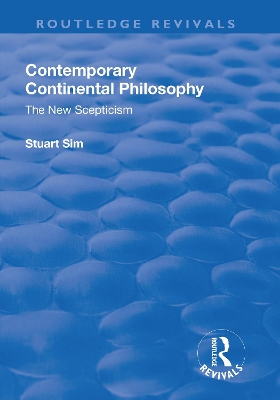Ashgate New Critical Thinking in Philosophy
1 total work
This title was first published in 2000. Contemporary continental philosophy is a widely-used, but in many ways a highly problematic, term and its exact frame of reference is not always clear. In its more recent French manifestations in particular, it continues to arouse considerable controversy and create bitter divisions, with particularly hostile reactions to the work of Derrida and others. Much work in the recent continental tradition can be fitted into a longer-running philosophical tradition of scepticism, and scepticism has always had the power to provoke and unsettle the philosophical establishment. Presenting an overview of the philosophical landscape of the continental tradition since the 1940s, this book traces the establishment of the new, super-scepticism as an intellectual paradigm with the power to threaten and disorientate existing world-views and more traditional styles of philosophical discourse - marking the continental divide. Exploring how contemporary continental philosophy from existentialism to postmodernism can be characterised as this new, more resistant form of scepticism, Sim identifies a clutch of key themes - including "difference", "the subject", "antifoundationalism", "dialectics" - which have been obsessively worked over by key thinkers in the Existentialist-Postmodernist period and demonstrates how these have contributed to the development of a super-sceptical outlook. Presenting a new theme-led approach to provide an entry into current debates in continental philosophy, Stuart Sim reintegrates the work of Sartre into the more recent continental tradition, and suggests that something qualitatively different is now occurring in French philosophy.
